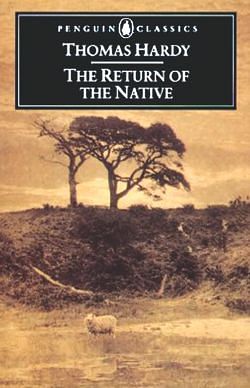The return of the native

THE Return of the Native is one of the best-known novels by Thomas Hardy (1840-1928). Like almost all other fictional works by Thomas Hardy, it also tells a tragic love story. Love is always followed by betrayal, happiness is always followed by dismay, faith is always followed by infidelity and sin is always followed by retribution is his novels. Involvement of nature with mankind is another remarkable point in his stories.
Clym Yeobright, the protagonist of The Return of the Native, returned from Paris leaving behind his diamond business there to Egdon Heath, a small village in England where his family lived. He returned to Egdon Heath because he loved the place and he wanted to pass the rest of his life with his mother Mrs. Yeobright and later on he picked up a job at a local school. While living in Egdon Heath, Clym Yeobright fell in love with Eustacia Vye, a pretty girl of that place. As he approached his mother with a proposal to marry Eustacia Vye, his mother initially did not consent to it. Eustacia Vye, according to Mrs. Yeobright, did not like Egdon Heath. She had very high dreams in her mind about living in big cities like Paris or London. On the other hand, Clym Yeobright did not want to move away from Egdon Heath, from the English countryside. However, Clym Yeobright did not pay heed to his mother's advice and married Eustacia Vye. A great tragedy slammed Clym at that time. His mother died of snakebite. That was a severe blow to Clym's life. It made him gradually collapse both on physical and psychological fronts. Even he started losing his eyesight.
Clym's mother had intended to get him married to his cousin Thomasin Yeobright. Thomasin was a plain-hearted girl and did not have any high-flying ambitions. Like Clym, she was also in love with Egdon Heath. The birds, trees, meadows of Egdon Heath charmed her all the time. So, she would have been a better match for Clym. But Clym was immersed in love with Eustacia which is why he did not care for thinking about all these matters. Thomasin was later on married to Damon Wildeve, a very tricky and immoral fellow who developed a clandestine affair with Eustacia giving her assurance about taking her to Paris. In this way he instigated Eustacia Vye to act faithlessly with her husband Clym. Diggory Venn, a benevolent and mysterious character of the novel saw Eustacia a number of times having secret trysts with Damon Wildeve and he could presume what they were about to do. He shared his concern with Clym, but Clym was too upset with his mother's unnatural death to pay heed to Diggory Venn's warnings. Moreover, he envisioned his relationship with his wife Eustacia from an ideal standpoint. He had a trust that Eustacia would never abandon him. But he was wrong. Eustacia Vye decided to run away with her extramarital lover Damon Wildeve but unfortunately they both drowned in the river. This is how Eustacia paid the price for cheating on her husband and the same thing happened to Damon Wildeve for derailing Eustacia Vye. Diggory Venn married Thomasin following the death of Damon Wildeve. On the other hand, Clym Yeobright, who was absolutely shattered by losing his mother and his wife, losing his eyesight, became a priest at the end of the story. He decided to look for solace through theological services. Clym committed the mistakes that most of the tragic heroes make. He could have avoided his marital disaster if he listened to his mother and married Thomasin. He could have restrained Eustacia from escaping with Damon Wildeve if he listened to the cautionary words of Diggory Venn. The blunders committed by Clym Yeobright remind us of an aphorism by Francis Bacon, “To love and to be wise is impossible.” Love blindfolds people. Love at times takes away people's power to visualize things from a rational point of view.
Clym Yeobright fell a victim to ill-fate as well. Perhaps he could have evaded all the tragedies of his life if he did not leave Paris. But he came back to Egdon Heath just because of his selfless love for his birthplace and for his mother. He had no idea about the disasters he would confront in Egdon Heath. We cannot foresee our upcoming days. We have no power to jump over predestined catastrophes. Another noteworthy point of the novel is that, there is a special thing called divine justice which does not allow any act of sin to go unpunished. The pathetic deaths of Damon Wildeve and Eustacia Vye are evidences of this message.
The writer is Senior Lecturer, Department of English, Metropolitan University, Sylhet

 For all latest news, follow The Daily Star's Google News channel.
For all latest news, follow The Daily Star's Google News channel. 



Comments